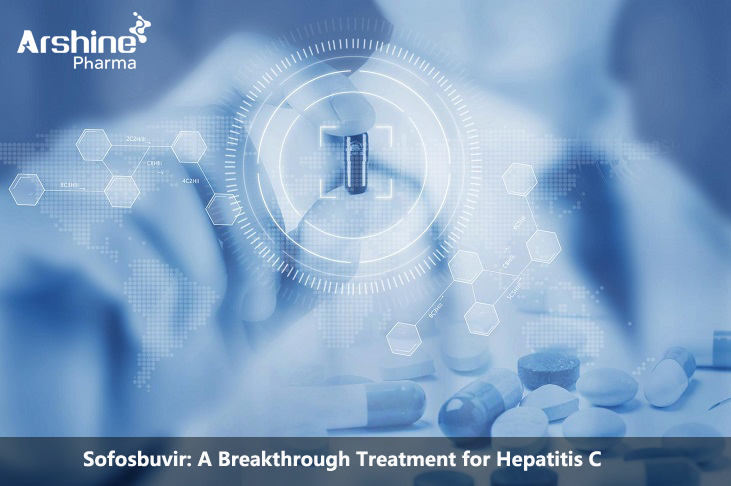
Introduction:
Sofosbuvir is a potent antiviral medication that has revolutionized the treatment landscape for chronic hepatitis C virus (HCV) infection. Developed by Gilead Sciences, it was approved by the United States Food and Drug Administration (FDA) in 2013 and quickly gained worldwide recognition for its high efficacy and excellent safety profile. In this comprehensive article, we will delve into the wonders of sofosbuvir, its mechanism of action, therapeutic benefits, and the socioeconomic aspect surrounding the "sofosbuvir price."
Understanding Hepatitis C:
Hepatitis C is a viral infection affecting the liver, caused by the hepatitis C virus (HCV). It is a major global health concern, with approximately 71 million people infected worldwide. Hepatitis C is often asymptomatic during its early stages, leading to chronic infection in a significant proportion of cases. Left untreated, chronic HCV infection can progress to liver cirrhosis, liver failure, and hepatocellular carcinoma, making it a leading cause of liver-related morbidity and mortality.
Conventional Treatments and Challenges:
Before the advent of sofosbuvir, the standard treatment for hepatitis C consisted of pegylated interferon (peg-IFN) and ribavirin. However, this regimen was associated with limited efficacy, numerous side effects, and prolonged treatment durations, typically lasting for 24 to 48 weeks. Additionally, peg-IFN-based therapy was not suitable for certain patient populations, including those with liver cirrhosis or co-existing medical conditions.
Sofosbuvir Mechanism of Action:
Sofosbuvir belongs to a class of antiviral drugs known as nucleotide analog NS5B polymerase inhibitors. The hepatitis C virus relies on an RNA-dependent RNA polymerase called NS5B to replicate its genetic material. Sofosbuvir acts as a prodrug, meaning it is administered in an inactive form and gets converted into its active metabolite within the liver cells.
Once activated, sofosbuvir's active metabolite competes with the natural building blocks of viral RNA, incorporating itself into the growing viral RNA chain. This action leads to premature termination of viral RNA synthesis, effectively halting the replication process. As a result, the virus is unable to reproduce and propagate, and its viral load in the blood decreases significantly.
Therapeutic Benefits of Sofosbuvir:
The introduction of sofosbuvir has transformed the treatment landscape for chronic hepatitis C infection, offering several key benefits:
-
High Efficacy: Sofosbuvir-based regimens have demonstrated cure rates exceeding 90% across different HCV genotypes, leading to a sustained virological response (SVR). SVR indicates that the virus is undetectable in the blood six months after completing treatment, which is considered a functional cure for hepatitis C.
-
Shorter Treatment Duration: Unlike the lengthy treatment durations of conventional therapies, sofosbuvir-based regimens typically require as little as 8 to 12 weeks, leading to better patient compliance and treatment adherence.
-
Improved Safety Profile: Sofosbuvir is well-tolerated, with fewer adverse effects compared to peg-IFN-based therapies. Common side effects include mild headache, fatigue, and nausea, which are usually transient.
-
Pan-genotypic Activity: Sofosbuvir has activity against all major HCV genotypes, making it a versatile option for patients with different viral subtypes.
-
Applicability to Special Populations: Sofosbuvir has been proven effective in patients with liver cirrhosis, post-liver transplant recurrence, HIV co-infection, and other challenging populations.
-
Reduced Need for Liver Transplants: By effectively curing hepatitis C, sofosbuvir has contributed to a decline in the number of liver transplants needed due to end-stage liver disease caused by chronic HCV infection.
Financial Implications and "Sofosbuvir Price":
While sofosbuvir has revolutionized hepatitis C treatment, its high cost has been a topic of significant debate and concern. When sofosbuvir was first launched, its price was set at a staggering $1,000 per pill, making a full 12-week course of treatment exceed $84,000. This led to outcry from patients, healthcare providers, and advocacy groups who argued that such exorbitant pricing could limit access to the medication, particularly in low- and middle-income countries.
Gilead Sciences faced criticism for its pricing strategy, with accusations of prioritizing profits over public health. In response to the mounting pressure, Gilead negotiated voluntary licensing agreements with several generic drug manufacturers in India and Egypt, allowing them to produce and sell generic versions of sofosbuvir in certain countries.
These generic versions of sofosbuvir significantly lowered the cost of treatment and expanded access to millions of people in need. For instance, the "sofosbuvir price" in India dropped to as low as $4 per pill, bringing the total cost of treatment down to a few hundred dollars for a 12-week course.
Despite these efforts, the pricing of sofosbuvir and other direct-acting antivirals (DAAs) for hepatitis C remains a complex and contentious issue. Access to affordable treatment varies widely among countries, and many patients in high-income countries still face challenges in obtaining coverage for these medications due to cost considerations by healthcare systems and insurance companies.
Conclusion:
Sofosbuvir has undoubtedly been a game-changer in the treatment of chronic hepatitis C infection. Its high efficacy, shorter treatment duration, and improved safety profile have transformed the lives of millions of patients worldwide. Despite initial concerns about the "sofosbuvir price," the availability of generic versions has significantly improved accessibility for many, particularly in low- and middle-income countries.
While challenges related to the cost of sofosbuvir and other DAAs persist, ongoing efforts by governments, advocacy groups, and pharmaceutical companies are essential in ensuring equitable access to these life-saving medications. As research continues and new therapies emerge, the ultimate goal remains the global elimination of hepatitis C, leading to healthier populations and reduced burdens on healthcare systems.
